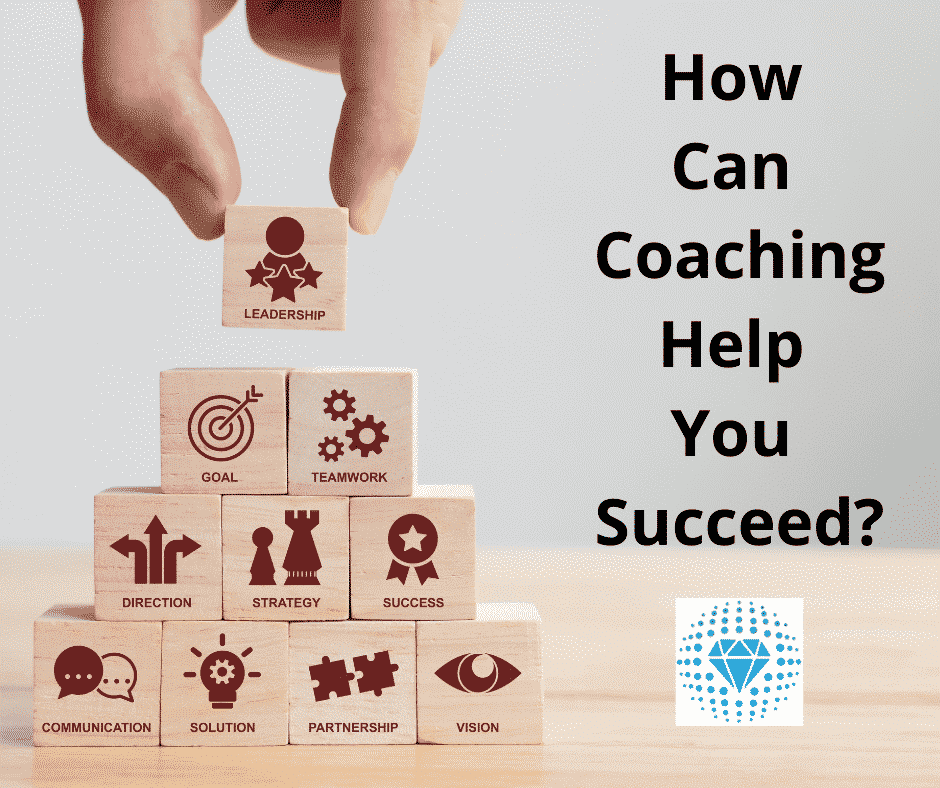Does coaching create success? If you’re like me, you may have wondered about this. I’ve known about coaching for many years from work, I even went on a couple of training courses. But I only truly discovered its full potential a few years ago. It’s impact was truly life changing – so much so that I decided to become a coach myself!
Below, I explain what coaching is, before looking at what distinguishes it from some other interventions. I outline what could happen in a coaching session, how coaching could benefit you and how to go about finding a suitable coach. I finish with a few points on my own coaching niche.
What is coaching?
Coaching is a development method that “unlocks a person’s potential to maximize their own performance. It is helps them to learn rather than teaching them” according to Sir John Whitmore, a pioneer of the coaching movement, in Coaching for Performance.
Coaches simply help their clients get from where they are today, to where they want to be, growing their dreams into reality and unlocking their true potential. They raise their clients’ awareness levels, and bring light to their issues, values and ambitions. They support their clients in devising action plans to enable them to reach their full potential and achieve their goals.
Importantly, coaches ensure clients retain and accept responsibility for carrying out their agreed actions.

How does coaching differ from other methods?
It’s probably fair to say that there are similar methods and interventions that sometimes get confused with coaching. Coaches, Mentors, Consultants and Counsellors all share certain skills, for example, but are also quite different in their approaches.
Common skills
Essentially, are all skilled in working with people e.g. needing to be able to communicate well and to build rapport, respect and trust. They all need great listening skills to appropriately understand and interpret the situation under review. They also need good questioning skills to be able to identify and ask appropriate questions.
Mentoring v Coaching
Mentoring may focus on a specific job or task, while coaching sessions work towards a defined goal.
Mentors often work with those seeking direction from someone with experience and knowledge in a specific area. Coaches, on the other hand are experts in the coaching process, and not necessarily in the client’s area of interest.
Mentors often share their knowledge and experience, offering tips and hints. Coaches don’t offer advice or make suggestions but help clients to generate their own ideas.
Consulting v Coaching
A consultant is an expert who is called on for professional or technical advice or opinions, while coaches are experts in the process. They are not necessarily in the client’s area of interest.
Consultants give recommendations and clear logical advice. Coaches don’t offer advice or make suggestions but help clients to generate their own ideas.
Consultants are often expected to help solve problems, whilst coaches help their clients come to their own conclusions.
Counselling v Coaching
Counsellors may work with those experiencing significant levels of distress which is impacting on their everyday life. Coaches work with clients around their desire to move forward in their lives and achieve their ambitions.
Counsellors’ focus is mainly in the past, while coaching is goal centred and forward moving.
Counsellors are trained to diagnose and help client with emotional problems, the past or dysfunction, while coaches encourage and support clients to become the best they can.
OK, it’s great to learn more, however, does coaching create success?
What happens in a coaching session?
While coaching can bring amazing results, there is no standard magic formula used by all coaches and in each session. This would be dull and predictable, and anyone could do it.
Coaches typically work with a range of tools to help the client to understand where they are today versus where they want to be. The coach essentially listens and asks questions to help the client to better understand their goals and to generate their own solutions on how best to move forward.
An example of a popular coaching tool is GROW. This is a simple and effective model to support a client to get from where they are now to where they want to be. It can be used in a variety of coaching contexts, including personal situations, performance, team, corporate coaching etc.
Simply put, it’s a framework for identifying goals, exploring reality, looking at options and securing commitment. It is made up of the following stages, that the coach will walk through in each session:
G – GOALS. What do you want?
R – REALITY. What is the current situation?
O – OPTIONS. What could you do?
W – WILL, Wrap-up, Way forward What will you commit to?
There are many other models and tools that coaches may choose to use with their clients, depending on preferences and the needs of the client at a point in time.
How could coaching help you?
We’ve seen above that coaching helps clients set goals and then work to achieve them, understanding where they are now and how to bridge the gap. Coaching does create success by driving growth and improvement.
Goals can be anything the client wants to work towards including Having (I want a new job), Being (I want to be fulfilled), Doing (I want to take on a new challenge) and Performance (I want to excel in my role) type goals.
6 reasons why coaching could help you include:
- Gives you insights into yourself – coaching helps to raise the client’s self-awareness, including their values, beliefs, strengths, the language they use
- Stimulates ideas you’d not previously thought of – coaching can challenge clients to reach deep into their unconscious and often surprise themselves
- Gives you a stronger sense of belief and self-confidence – by helping to focus on strengths, prior successes and small wins towards bigger goals
- Makes you more accountable – clients are ultimately in charge of taking the actions, but the coach holds them accountable
- Saves you time and gets you faster results – much more direct and results oriented than working on your own
What Type of Coach Do I Need?
Thanks to the success and increasing popularity of coaching, coaches are now widely available. It really depends what you are looking for.
Generalist v niche – some coaches provide more general life coaching, while others carve out niches for themselves to appeal to clients in a specific field. Blue Diamond specialising in career coaching – including career management, career development and career transition.
Face to face v phone v video – coaching has traditionally been done face to face i.e. a conversation between two people, but can also easily be done via phone or using technology such as Skype or Zoom. Depending on what you’re looking for you may want someone local to you, or you could have a coach in a different town, or even in a different country.
Do I need a Coach?
The simple answer is Yes!
A coach can be for anyone looking for support and a third-party perspective. Specific circumstances that would benefit mostly from Career Coaching in particular are;
- If you are looking for a new career or are currently looking into starting your own business.
- If you are unhappy at work and unsure how to proceed.
- If you are directionless and confused as to what to do next.
- If you have a new opportunity that has arisen but are unsure of the pros and cons.
- If you have a problem at work and require the advice of a third-party.
How to Find the Right Coach
Many coaches find clients by referrals, but most also have websites these days as well as advertising through Facebook and LinkedIn. You could do a Google search of coaches near you, or you could look up on a coaching directory such as Life Coach Directory or Coach Federation. One you’ve narrowed down your search, it’s often worth having a discovery call with them to check there is rapport and they can help to support you with what you need.
A Coach for a Coach
I have had coaches during my journey as a coach. This has provided unparalleled insight into my patterns and motivators, aiding me in becoming the confident coach I am today. If you are a coach, you can benefit from one for yourself. Many therapists have one of their own to talk and act as a soundboard – and this is no different!
If you are looking for tips about how to be a successful coach or would like to gain more knowledge about aspects of coaching in 2021, my Simply Confident Masterclasses would be a good fit but if you just need a sympathetic ear, I can be that too!
Blue Diamond Coaching Creates Success
You won’t be surprised to learn about my niche. I help career professionals regain their focus and passion or identify their next challenge, based on their skills and motivations.
Learn how Blue Diamond Career Coaching could help you.
Does Coaching Create Success?
Coaching brings significant benefits to many people.
It has certainly enabled me to achieve many of my own goals over the past 4 years and I will continue to use coaches to support and empower me along my own journey.
I’m keen to support you too on your journey, through my coaching as well as through the Blue Diamond blog.
Thanks for reading. Check out other Blue Diamond articles to help you take control of your work and life.



